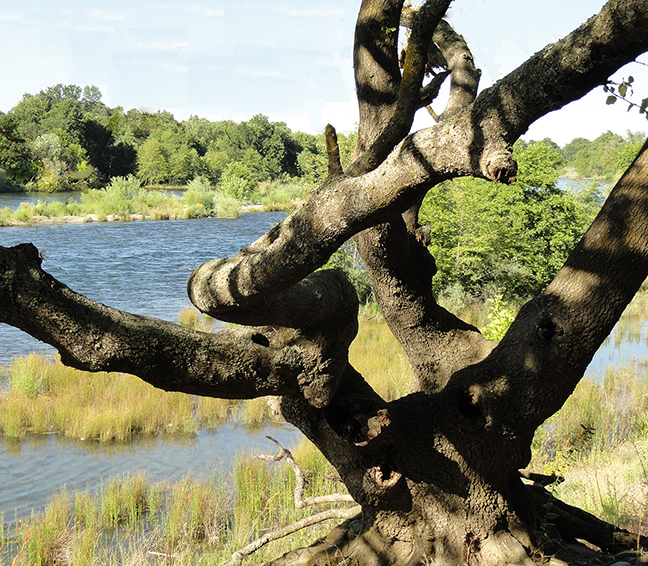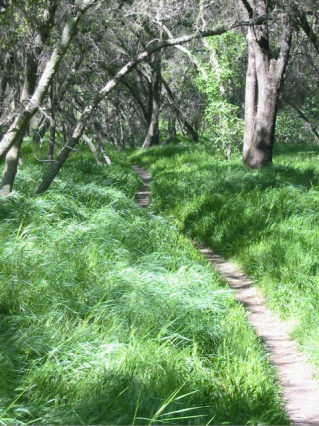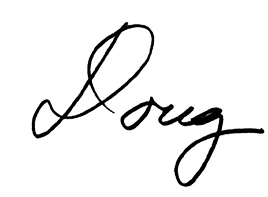
March 18, 2018
It rained hard the other day so there are lots of puddles along the river path. The air feels clean and fresh. The sky is filled with puffy clouds. Two geese with alarms honking swoop over my head before settling into the field in front of me. As they quiet I hear songbirds near and far and the rush of the rapids. Two ducks sleep on a rock in the river with their bills tucked under their wings.
My awareness comes closer to home as I notice the padding of my feet on the ground, the rising and subsiding of my chest, a soft ringing in my ears.

“Awareness is lovely,” I think. I don’t mean the puddles, clouds, ducks, songbirds, rapids, or the cool air on my cheeks. They are lovely. But the fact that I can see, hear, feel, and think is miraculous. We live in a universe where something can know of something else.
But who’s aware? What is it that knows?
Right now as you read these sentences, you can see the words, assign meanings, and notice other sensations and thoughts. But who or what is noticing them?
It’s a simple yet enigmatic question because anything we call “me” is something we notice. What is aware of what notices?
It’s a mystery. Thomas Merton called it the “unknown self.” The known self is the stuff that defines who we think we are: body, thoughts, aspirations, memory, and so forth. But what knows these objects is itself not knowable.
In Buddhism, one of the words for mind is “citta” which means “that which knows and thinks.” But that doesn’t tell us what the “that” is that knows and thinks.
Deeper meditation practice is a middle way between attending to the objects of awareness and intellectually trying to figure out what is aware. The middle way is awareness of the process of awareness.
The Swiss developmental psychologist Jean Piaget said that knowing begins with contact between the organism and the environment. From this raw sensation we extrapolate out to guess what causes the sensation. And we extrapolate in to guess who experiences the sensation. The further we extrapolate, the further we move from actual experience into abstraction.
Meditation invites us to not extrapolate. It encourages us to notice seeing, hearing, touching, tasting, thinking as they arise and pass. This “knowingness” comes and goes.

As we relax into awareness itself, a vast silence may open behind those phenomena. This immense quiet is always with us beneath mental chitchat. Even right now. Can you feel it?
I first learned of this on meditation retreats. But once I began noticing that pervading peace, it started to leak into everything. As I walk along the river noticing awareness I smile spontaneously. It has that effect. Awareness of awareness lightens the mind-heart.
Meanwhile on the footbridge over the river, I notice a woman walking toward me with a black dog. She smiles. I say, “Hello.” She says, “I read your book.” I don’t know her. I’m intrigued and flattered. We talk for a few moments. Then we go our separate ways.
Those few moments of social conversation obscured the immense peacefulness. I lose touch with it all the time. But it doesn’t worry me. As I wander deeper into the woods, the sense of self begins to fade gently into awareness.
I used to write little songs to help me remember how to do this. I used words like:
Listen gently, open a little more.
Peace is already here.
No need to seek, no need to shun,
Joy or pain or fear.
Metta,

Copyright 2018 by Doug Kraft
This document is licensed under a Creative Commons Attribution-NonCommercial 4.0 International License. You are welcome to use all or part of it for non-commercial purposes as long as you credit the author. Specific licensing details are here.
How to cite this document
(a suggested style): "Blog: Who or What is Aware?" by Doug Kraft, www.dougkraft.com/?p=Blog180318WhoAware.